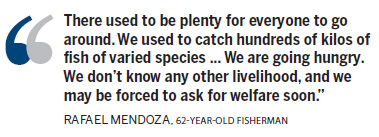Fewer bites for Philippine fishermen
Updated: 2011-07-09 08:00
By Jason Gutierrez (China Daily)
|
|||||||||||

Modern, destructive fishing methods have heavily damaged spawning grounds
MANILA, the Philippines - Fisherman Rafael Mendoza spends his nights casting lines from his small motorized boat in Manila Bay with little hope of a big haul.
At the age of 62, the once-lucrative returns from fishing, which paid for his seven children's primary and college education, have nearly disappeared.
"There used to be plenty for everyone to go around," Mendoza told AFP in his tiny fishing village of Daang Kalsada on the mouth of Manila Bay as he picked through the measly haul of 60 small mackerel he had caught overnight.
"We used to catch hundreds of kilos of fish of varied species. There used to be huge groupers and snappers."
Generations of fishermen have relied on the 1,994 square kilometer deep-water bay for their livelihoods, and it wasn't uncommon for them in the past to come to shore with their boats bursting with marine bounty.
But over the years, rapid and uncontrolled urban development around the bay - which is the gateway to the country's political and economic center - has led to severe pollution and degradation of the marine habitat.
Modern and destructive fishing methods, such as using cyanide and fine mesh nets, have also virtually obliterated spawning grounds.
Meanwhile, big commercial trawlers continue to violate a law meant to keep them at least 15 km from the shoreline.
"There used to be huge groupers and snappers that we would sell for thousands of pesos," Mendoza said, adding that restaurants and buyers in the lucrative export market once turned to them for supply.
The sad state of Manila Bay is being repeated across the Philippines, which international experts and scientists regard as having one of the most bio-diverse marine ecosystems in the world.
Its southern waters merge with those of Indonesia and Papua New Guinea to form what is known as the Coral Triangle, an area so rich in corals and marine life that it is nicknamed the "Amazon of the Seas".
However, weak enforcement of laws protecting the Philippines' environment and marine life are allowing unsustainable fishing methods to grow and prosper, experts said.
"We've already exceeded our maximum sustainable yield in fishing," World Wildlife Fund-Philippines President Jose Maria Lorenzo Tan said.
He said that while there was nothing wrong with harvesting nature's bounty, aquatic resources need to be given time to replenish.
Dante Dalabajan, policy and research officer at British charity Oxfam, said both small and industrial fishermen need to follow sustainable fishing methods, with climate change also contributing to dropping yields.
As sudden changes in sea temperatures affect the way fish migrate and spawn, there will be lower yields, according to Dalabajan, a view shared by many environmental experts around the world.
"What is critical is for our fishermen to manage their resources better, so they can protect their food security when that time comes," Dalabajan said.
He said one important measure would be to give small-scale fishermen more control over managing coastal areas, while another would simply be for the government to exert greater effort in protecting fishing grounds.
However, fisherman Mendoza and his wife, Rosario, said they were worried any intervention may be too late for them.
They said many of their neighbors in Daang Kalsada had already hung up their lines and nets.
Some had sought work in factories that had sprouted near the town in recent years, while others had left to join the millions of Filipinos laboring abroad to seek their fortune.
The Mendozas and some of the other remaining fishermen have joined non-government organizations to educate other villagers in the area about the benefits of protecting the sea.
Some of the fishermen sit and listen, but others - because they are pressured to feed their families - still resort to destructive fishing methods.
"Whatever awareness campaigns we launch, if our fellow fishermen themselves do not act, nothing will happen," said Mendoza. who now has to travel more than a hundred km into open sea in an effort to catch decent fish.
"We are going hungry. We don't know any other livelihood, and we may be forced to ask for welfare soon."
Agence France-Presse
(China Daily 07/09/2011 page6)